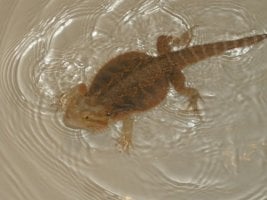The best way to hydrate your bearded dragon depends significantly on your beardie's personality and preferred habits. For example, some bearded dragons have no problem drinking straight from a water dish in their enclosure.
However, many bearded dragons ignore their water dish, likely because they cannot always recognize still water as something they can drink. Instead, they prefer to drink water while they get a bath. Please note that your bearded dragon must drink the bath water to hydrate in this fashion since bearded dragons cannot absorb water through their skin or vent.
Some bearded dragons dislike water and get stressed by baths. In those situations, it may be necessary to slowly drip droplets of water on their snout using a dropper and wait for them to lick it up (assuming your dragon is showing signs of dehydration).
All bearded dragons should receive daily fresh feeder insects/worms and greens/veggies. The moisture content in their food is crucial for helping beardies meet their daily water intake needs. Certain feeders like hornworms are excellent when your beardie needs extra hydration.
Another way to incorporate extra hydration is to spray the greens/veggies with water before offering them to your dragon.
Bearded Dragon Hydration Safety Considerations
Water Dishes
If you use a water dish, please ensure it is shallow to prevent accidents. Many bearded dragon owners don't use a water dish since beardies frequently ignore it.Tap water is acceptable without any reptile water conditioner since bearded dragons can drink water that is safe for humans. However, if you have bad water, feel free to use bottled water, filtered water, or add a reptile water conditioner.
Even though it may be tempting to add a small water fountain or a bubbler to your beardie's enclosure in the hopes that they would recognize moving water, please note that this would likely raise the humidity too much in the confined space of a bearded dragon enclosure.
Baths
When bathing your bearded dragon, please ensure the water level only rises to its elbows. Bearded dragons must always be carefully attended to during baths since they can easily aspirate water into their lungs or drown.Dropper/Syringe Method
If you're putting droplets of water on your beardie's snout, stop dripping the water if your beardie moves away since that probably means they have had enough. Never squirt or force water directly into your beardie's mouth since that could cause your bearded dragon to aspirate. Let your bearded dragon drink as much as they are willing, but never force it since bearded dragons originated from arid environments and do not need a lot of water.If you must offer water via a syringe directly into a bearded dragon's mouth, go exceptionally slowly and allow your beardie to swallow the water gradually to avoid aspiration.
Hydration from Food Sources
If you use hornworms to give your bearded dragon a hydration boost, always use worms you purchased from a vendor instead of catching your own since wild hornworms may have ingested poisonous plants or may carry parasites. Also, be sure not to over-feed them to your beardie since they may cause diarrhea or watery stool due to their high water content.Recognizing Signs of Dehydration in Bearded Dragons
Examining their stool and urate is the best way to tell if your bearded dragon is well-hydrated. Stool should be formed, and moist and urate should be white and moist. If you notice that the stool is dry or the urate is dry, rock-like, or chalky-looking, your beardie is likely dehydrated. On the other hand, if the stool has water around it, the dragon may be trying to eliminate some excess water. In most cases, this is only a problem if you see diarrhea.Overly hard stool/urate can lead to organ prolapse in bearded dragons, so it is crucial to monitor the consistency of the stool/urate regularly.
Other signs of dehydration in bearded dragons to look for include:
- loss of skin elasticity/saggy skin
- changes in the color of the urate (should be white)
- dry, flaky skin
- overly wrinkled or puckered skin (if you gently pinch your beardie's skin on the side of the body, it doesn't quickly go back down and stays puckered)
- sunken eyes
- lethargy
- lack of appetite
- constipation
While leafy greens should be the staple in your bearded dragon's diet (in addition to live insects/worms), if your beardie could use some extra hydration, it's ok to offer an occasional cucumber, strawberry, melon, pumpkin, or another safe food with high water content.
Bearded Dragon Hydration During Illness and Other Special Circumstances
If your bearded dragon is ill, he may refuse to drink water. In this situation, it may be appropriate to use diluted grape juice or apple juice to entice your beardie to drink (do not use citrus juice). If you gently offer diluted juice via a syringe, clean off any liquid that may dribble down to avoid potential issues with bacteria, etc.Suppose your bearded dragon comes out of brumation or seems significantly dehydrated. In that case, it may also benefit from some unflavored Pedialyte diluted with water. Some reptile supply companies also make reptile electrolyte formulas that can be mixed into water.
If your bearded dragon is very ill and shows signs of severe dehydration, an exotic pet veterinarian can give them subcutaneous fluids (fluids introduced manually under the skin), which should keep your beardie hydrated for a few days.
When dealing with a bearded dragon that isn't able to eat or drink, please carefully review your husbandry practices and adjust as needed.
Conclusion
Please give your bearded dragon clean drinking water regularly, but only stress out about all the various ways of keeping your beardie hydrated if your dragon is dehydrated. Bearded dragons raised with proper husbandry practices can get most of their daily water intake from their diet.Your best indicator for hydration levels is your beardie's stool and urate. So keep an eye on those, which should be easy as part of your regular tank maintenance.
Always use common sense when giving water to your beardie. Please don't force your dragon to drink it; always go slowly. It's usually best to encourage your beardie to drink the water themselves to avoid aspiration.
Display on Homepage :
- Enabled
Attachments
Last edited:

